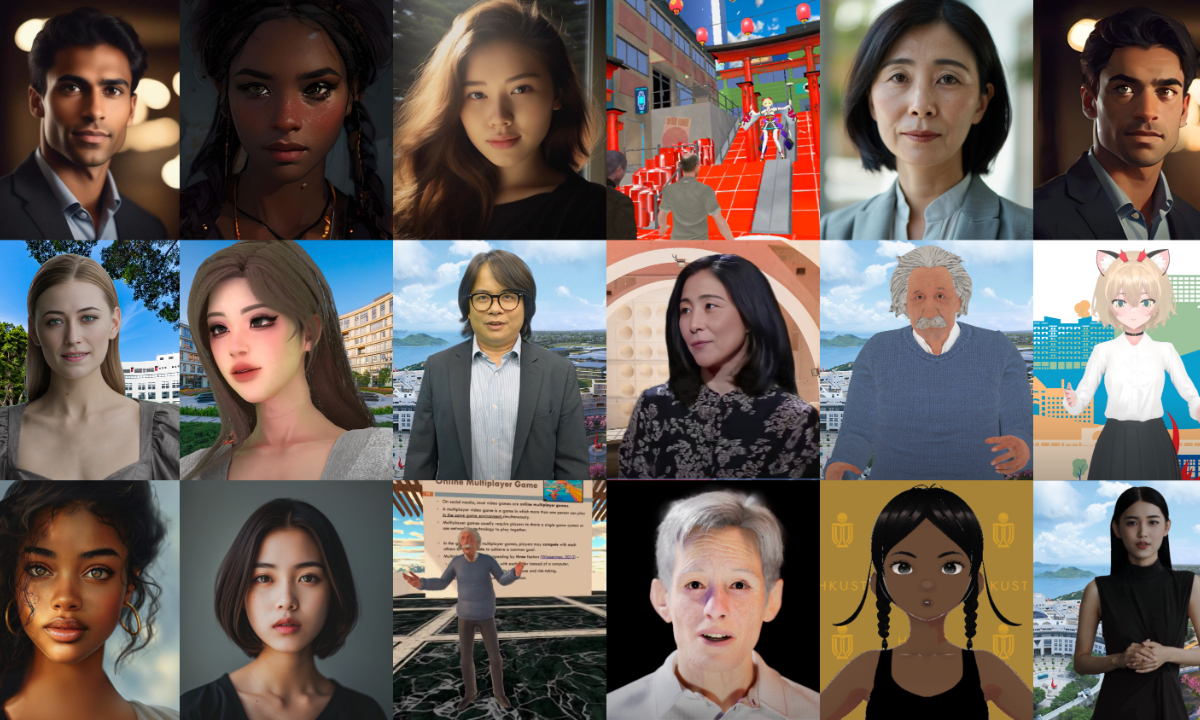University in Hong Kong develops AI lecturers including Albert Einstein to revolutionize college classrooms

AI lecturers. Photo: Courtesy of Pan Hui, chair professor of Computational Media and Arts and Director of the Centre for Metaverse and Computational Creativity at the HKUST (Guangzhou)
With virtual reality (VR) headsets, students at a Hong Kong university can now have lectures on game theory presented by an AI-generated Albert Einstein facilitated by a project led by a research team from the Hong Kong University of Science and Technology (HKUST) (Guangzhou). The technology is expected to revolutionize college classrooms.
Including AI-generated Albert Einstein, mathematician and Nobel Prize laureate John Nash and Professor Pan Hui, the project leads for HKUST’s AI project, a total of 10 AI-generated teachers were designed by tools of artificial intelligence-generated content (AIGC) to boost students’ involvement and motives and enrich the teaching forms in classrooms.
Apart from the aforementioned avatars which were designed according to real prototypes, all the other seven AI lecturers were designed from sketch — based on different origins, cultural backgrounds, character settings, and styles, with customized appearance, voices, and gestures. They can be displayed on either screens or VR headsets.
Led by Hui, the chair professor of Computational Media and Arts (CMA) and the Director of the Centre for Metaverse and Computational Creativity at the HKUST (Guangzhou), the research team used multiple AIGC tools including Midjourney, ChatGPT, Bing, as well as the team’s self-developed variational 3D full-body generator and a 3D motion generation system to create smoother avatars’ movements to improve students’ learning experience through natural expressions and movements.
The mass availability of tools such as ChatGPT has sparked optimism about new leaps in teaching and learning, Hui told the Global Times on Thursday, noting that it is a trend that more AI technologies will be integrated into future classroom teaching and students’ performance assessment.
Throughout the semester, the AI lecturers were teaching the course, Social Media for Creatives, which covers a variety of topics including gamification of learning, immersive experiences, and the impact of social media on society.
To understand the impact of AI lecturers on teaching effectiveness, students’ learning motivation, and performance, the team also collected feedback from students after each class. They target to understand how different styles, physical appearances and styles, verbal and non-verbal expression, dimensions (2D/3D), accents, and modes of expression affect the influence of AI lecturers on students in terms of trust, attractiveness, and affinity.
The research team, as a next step, will utilize large-scale language models and introduce the responsive AI lecturers to enhance their interactivity, allowing reply to students’ questions.
According to Hui, the AI lecturers will complement to human lecturers in teaching activities to make some boring topics more interesting, allow teachers to cater for individual education needs and consider the differentiations in learning among students, as well as explore creative teaching modes.
According to Hui, more than 90 percent of his students reflect their welcome to AI lectures whom they think are more absorbing and creditable.
With the introduction of the latest AI chatbot GPT-4o, Hui foreshadowed that AI technologies will bring more revolutions to the teaching and learning practice, as students’ feedback shows their expectations of 24-hour approachable AI digital teachers via different media channels in their mobile phones and laptops.
Besides, Hui said that the digital teachers can perceivably customize teaching for different students based on the students’ strengths and weakness assessed by the AI algorithm.
“With AI technology, teachers’ role will gradually change from a knowledge disseminator into someone like a curator who integrates more elements in teaching activities to train students in critical thinking and creativity,” Hui said.
Photos
Related Stories
- HKSAR gov't welcomes policy of visa-free entry via cruise ships at coastal provinces
- China's large-scale AI models boost industrial development
- China, US engage in in-depth, professional and constructive exchanges on AI
- China to see stable growth in ICT spending amid AI boom: IDC
- Conference to deepen exchanges on global prosperity held in Hong Kong
- Microsoft denies asking AI team to relocate from China
Copyright © 2024 People's Daily Online. All Rights Reserved.









